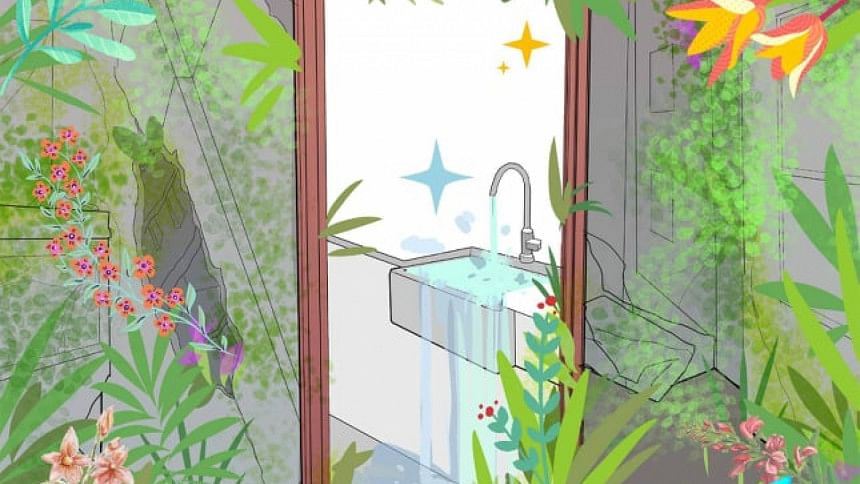New online journal ‘Kitchen Sink’ promises an accessible platform for poets

About a month ago, a few friends sent me invites to follow the Facebook page of a literary journal about to launch their website and first issue. Being an aspiring writer, whose late-night browsing history sometimes consists of visits to international literary magazines, searching for writing opportunities, I was thrilled to see a platform open up close to home.
The name of this journal, Kitchen Sink, instantly reminded me of kitchen sink realism, a cultural movement that took hold in Britain in the late '50s and early '60s. It explored the realities of working class people through plays, film, art, and novels. While Kitchen Sink is quite different from its namesake movement in that it is unapologetically Bangladeshi, it shares the spirit of making art—in this case poetry—accessible.
"The local poetry scene felt like an exclusive space that gathered at events I couldn't attend", Arwin Shams Siddiquee, a member of Kitchen Sink's website development team, says. "We wanted a platform that did not decline poets without nurturing feedback and encouraging improvement. We wanted a space to collaborate: an inclusive, welcoming, and accessible area where like-minded creatives could gather."
The earnest endeavour to connect with poets and readers alike shines through in the journal's first issue, "Let That Sink In", released in early June. All 28 poems explore a range of universal themes—love, death, family, friendship, mental health—yet they feel personal, each poem inviting the reader to step into the poet's shoes.
Joyita Faruk, editor and illustrator, agrees. "It's intriguing to see how the poets brought out their innermost feelings. Our goal was to coalesce pieces that were emotive and connected while also shining individually."
"This ended with us getting some of the most varied poetic styles: from epic pieces that felt as if they were pulled from classical western poetry to modern compositions that were more intimate but equally powerful", Syed Raian Abedin, editor and member of the website development team, adds.
Indeed, the stylistic variety of the inaugural issue is what makes "Let That Sink In" a great starting point, because it showcases the virtuosity of local talent. Poems reminiscent of gothic romanticism, like Abraham Junaid's "Farewell", sit in the same package as the intimate confessions of Naveed Hossain's "Mother's Day", with the latter flowing between verse and abrupt line breaks.
Like "Mother's Day", which deals with the theme of parental abuse, there are a number of poems in "Let That Sink In" that tackle difficult topics and include content warnings. For some reason, I found myself drawn to these poems the most despite their subject matter. Entries like Nayara Noor's "Juxtaposition", which talks about self-harm, and Nawal Naz Tareque's "rose-tinted", which explores sexual abuse, may be triggering for some readers, but as the issue's title promises, these poems leave an impact and establish a connection with the reader.
Reaching out to so many people through poems while trying to leave a mark in the Bangladeshi English poetry scene was not easy, and, in Joyita's words, was "both fulfilling and backbreaking" for a core team of 15 people, all of whom are university or school students from diverse disciplines, including STEM and the humanities. A not-for-profit digital magazine, Kitchen Sink is funded by the core team since they don't have any sponsors. There is no subscription module or paywall to access their content, but they do accept donations from readers through bKash.
Despite this modest start, the magazine has succeeded in garnering much support on social media, living up to the hype with a promising first issue, impressive graphics and illustrations, and engaging blog posts about poetry. In the long run, Raian hopes all their hard work will contribute meaningfully to the current poetry scene: "It is still evolving, and I think Kitchen Sink can play a pivotal role in allowing poets to experience and try out the different forms that poetry comes in."
After "Let That Sink In", the team have set their sights on Bangla poetry while creating more content through their blog posts to keep readers and poets engaged. Their second publication is expected in September of this year, with the theme to be announced in July. For now, they are letting a sense of pride and accomplishment sink in.
Adhora Ahmed is a frequent contributor to SHOUT. Reach out to her at [email protected]

 For all latest news, follow The Daily Star's Google News channel.
For all latest news, follow The Daily Star's Google News channel. 



Comments